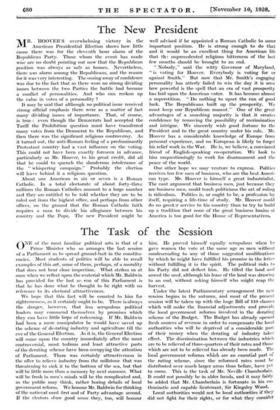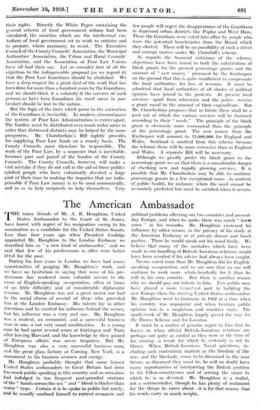The Task of the Session O NE of the most familiar
political arts is that of a Prime Minister who so arranges the last session of a Parliament as to spread ground-bait in the constitu- encies. Most students of politics will be able to recall examples of this art, some of them, perhaps, of a morality that does not bear close inspection. What strikes us at once when we reflect upon the material which Mr. Baldwin has provided for the last sa.i_on of this Parliament is that he has done what he thought to be right with no reference to its electoral attractiveness.
We hope that this fact will be counted to him for righteousness, as it certainly ought to be. There is always the danger, however, that less scrupulous political leaders may commend themselves 14 promises which they can have little hope of redeeming. If Mr. Baldwin had been a mere manipulator he would have saved up the scheme of de-rating industry and agriculture till the eve of the General Election. As it is, the General Election will tome upon the country immediately after the most controversial, most tedious and least attractive parts of the derating scheme have been occupying the attention of Parliament. There was certainly attractiveness in the offer to relieve industry from the millstone that was threatening to sink it to the bottom of the sea, but that will be little more than a memory by next summer. What will be fresh in men's minds will be the complicated and, as the public may think, rather boring details of local government reform. We honour Mr. Baldwin for thinking of-the national need first and of Party advantage second. If the electors show good . sense they, too, will, honour him. He proved himself equally scrupulous when he gave women the vote at the same age as men without condescending to any of those suggested modifications by which he might have fulfilled his promise in the letter without fulfilling it in -the spirit. The political risks to his Party did not deflect him. He tilled the land and sowed the seed, although his lease of the land was drawing to an end, without asking himself who might reap the harvest.
Under the latest Parliamentary arrangement the new session begins in the autumn, and most of the present session will be taken up with the huge Bill of 1-10 clauses which will make the financial adjustments and provide the local government reforms involved in the derating Scheme of the Budget. The Budget has already opened fresh- sources of- revenue in order to compensate the local authorities who will be deprived of a considerable part of their money when the derating of industry takes effect. The discrimination between. the industries which are to be relieved of three-quarters of their rates and those which are not to be relieved has already been made. The local government reforms which are an essential part of the rating scheme, since the reformed rates must be distributed over much larger areas than before, have yet to come. - This is the task of -Mr. Neville Chamberlain. It could not possibly be in abler hands, and it may fairly be added -that -Mr. Chamberlain is fortunate in his en- thusiastic and capable lieutenant, Sir Kingsley Wood. - Local authorities would not be local authorities if they did -not- fight for their rights, or for what--they consider their rights. Directly the White Paper containing the general scheme of local government ref9rrn had been circulated, the societies which are the intellectual cus- todianS Of local governinent set to work to criticize and to prepare, where necessary, to resist. The -Executive -Council Of the County Councils' Association, the Municipal Authorities' Association, the .Urban and Rural Councils' Association, and the Association of Poor Law Unions have all had their say. Let us consider first of all the objection to the indispensable proposal (as we regard it) that the Poor Law Guardians should be abolished. We have a deep respect for a great deal of the work that has beta dene for more than a hundred years by the Guardians, and We •Shciuld think it a 'calamity if the services of such persons as have been Guardians (in rural areas in par- ticular) should be lost te the nation. • ' - 'But the logic of the facts which point to the extinction of the Guardians is invincible: In modern circumstances the 'system of Poor 'Law Administration is extravagant. The burden- must be distributed over much wider areas in Order that distressed districts may be helped by the more prosperous: Mr. • Chamberlain's Bill rightly provides for Supplying Poor -La* funds on a county basis. The 'County councils 'must therefore be - responsible: The Work Of the Poor La*, by a sequence- that is inevitable, becomes 'part and parcel of the burden of the County Councils. The County Councils, however, will make a vast mistake if they do not call in the aid of those public- spirited - people Who have voluntarily devoted a• large part Of their time to making the inquiries that are indis- pensable if Poor Law money is to be used economically, and 'so as to help recipients to help themselves. Very few people will regret the disappearance of the Guardians in depressed urban districts like Poplar and West Ham. There the Guardians were voted into office by people who were the potential beneficiaries from- the Board which ' they elected. There will be no possibility of such a direct and corrupt motive under Mr. Churchill's scheme.
As regards the financial criticisms of the scheme, -objections have been raised to both the substitution of block grants for the present percentage grants and the amount of "new money" promised by the Exchequer on the ground that this is quite insufficient to compensate -the local authorities for loss of revenue. It must be admitted that local authorities of all shades of political • opinion have joined in the protests. At present local services—apart from education and the police—receive • a grant equal to the amount of their expenditure. But Mr. Chamberlain proposes that in future there shall be a pool out of which the various services will be financed according to their "needs." The principle of the block :grant is obviously more economical than the principle ' of the percentage grant. The new money from the Exchequer will amount to £5,000,000 for England and -Wales. Scotland is omitted from this scheme because the reforms there will be more extensive than in- England and Wales. A separate Bill will be necessary.
Although we greatly prefer the block - grant to the • percentage grant we see that there is a considerable danger • of checking new and rapidly growing- services. It is possible that Mr. Chamberlain may be able to continue percentage grants in a few exceptional cases—in matters of public health, for instance, where the need cannot be accurately predicted -but must be satisfied -when it occurs.













































 Previous page
Previous page